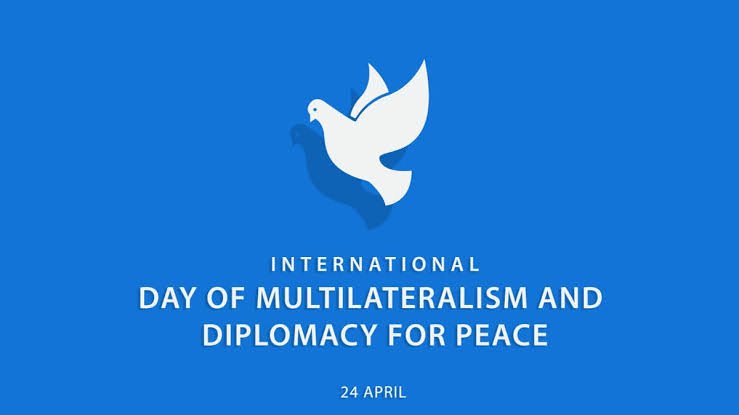The International Day of Multilateralism and Diplomacy for Peace, observed annually on April 24, is a significant reminder of the importance of cooperation in addressing global challenges and preserving world peace.
Established by the United Nations General Assembly in 2018, this day reinforces the belief that multilateralism — collective problem-solving through dialogue and diplomacy — remains the most viable path for maintaining international order, resolving conflicts, and promoting sustainable development.
In today’s interconnected world, challenges such as climate change, pandemics, terrorism, and global economic instability cannot be tackled by any single country. These complex issues transcend borders, making collaborative action not just preferable, but necessary.

Multilateralism provides the framework for such action by bringing together countries, organizations, independent activists, peace advocates, civil society, and all other relevant stakeholders to work towards shared goals through consensus and mutual respect.
Diplomacy for peace lies at the heart of this approach. Rather than resorting to conflict or unilateral decisions, peace diplomacy encourages dialogue, negotiation, and peaceful resolution of disputes. It fosters an environment where diverse perspectives are considered, cultural sensitivities respected, and trust built over time.
Through institutions like the United Nations, World Health Organization, and regional bodies such as the African Union, BRICS, SCO, countries can engage in structured dialogue, share responsibilities, and ensure that no voice is left unheard.

For developing countries like Pakistan, the emphasis on multilateralism and peace diplomacy holds particular significance. As a nation that has historically advocated for peaceful conflict resolution — especially regarding regional issues such as the Kashmir dispute or the situation in Afghanistan — Pakistan’s foreign policy aligns with the principles of multilateralism.
Pakistan’s active participation in UN peacekeeping missions and regional dialogues reflects its commitment to collective peace efforts.
Moreover, as global economic dynamics evolve, forums like the United Nations, the Organization of Islamic Cooperation (OIC), and the Shanghai Cooperation Organization (SCO) provide Pakistan with platforms to project its national interests while contributing to global peace.

However, the effectiveness of multilateralism is not without challenges. Rising nationalism, power rivalries, and mistrust among states have sometimes weakened international institutions and complicated decision-making.
Yet, the Day of Multilateralism and Peace Diplomacy serves as a call to renew commitment to collective action, particularly at a time when the world needs unity more than ever.
Ultimately, this observance is not merely ceremonial. It symbolizes a universal aspiration — that diplomacy, not war, should guide international relations. It is a call for unity over division, cooperation over conflict, and peace over violence.
In a world shaped by rapid change and uncertainty, multilateralism and peaceful diplomacy remain crucial pillars of a stable and just global order.
Areeba Kanwal is a contributor at The Diplomatic Insight and has passion for International Relations and diplomacy.



